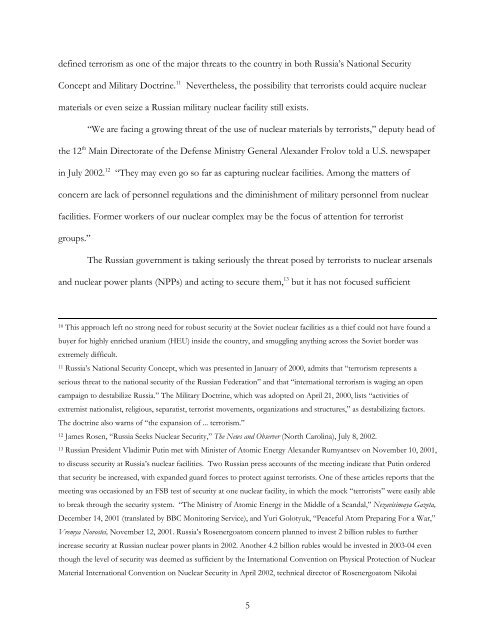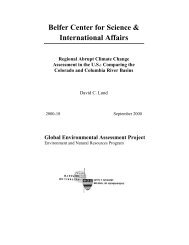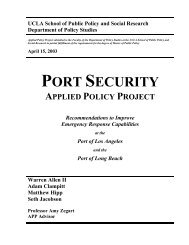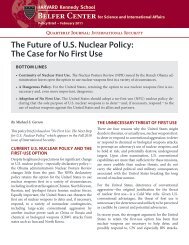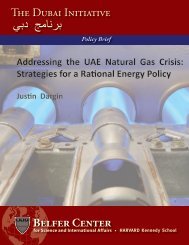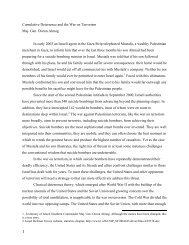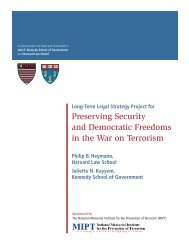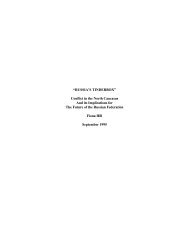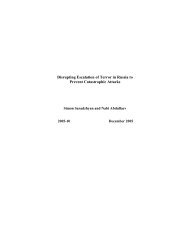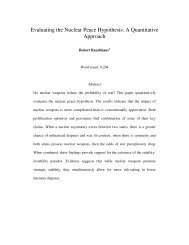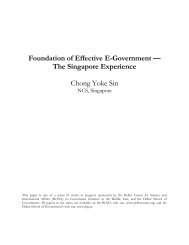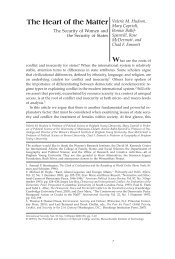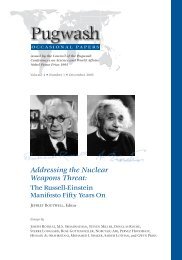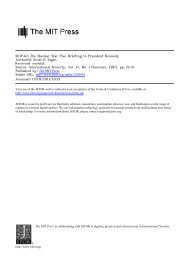Russia - Belfer Center for Science and International Affairs - Harvard ...
Russia - Belfer Center for Science and International Affairs - Harvard ...
Russia - Belfer Center for Science and International Affairs - Harvard ...
Create successful ePaper yourself
Turn your PDF publications into a flip-book with our unique Google optimized e-Paper software.
defined terrorism as one of the major threats to the country in both <strong>Russia</strong>’s National Security<br />
Concept <strong>and</strong> Military Doctrine. 11 Nevertheless, the possibility that terrorists could acquire nuclear<br />
materials or even seize a <strong>Russia</strong>n military nuclear facility still exists.<br />
“We are facing a growing threat of the use of nuclear materials by terrorists,” deputy head of<br />
the 12 th Main Directorate of the Defense Ministry General Alex<strong>and</strong>er Frolov told a U.S. newspaper<br />
in July 2002. 12 “They may even go so far as capturing nuclear facilities. Among the matters of<br />
concern are lack of personnel regulations <strong>and</strong> the diminishment of military personnel from nuclear<br />
facilities. Former workers of our nuclear complex may be the focus of attention <strong>for</strong> terrorist<br />
groups.”<br />
The <strong>Russia</strong>n government is taking seriously the threat posed by terrorists to nuclear arsenals<br />
<strong>and</strong> nuclear power plants (NPPs) <strong>and</strong> acting to secure them, 13 but it has not focused sufficient<br />
10 This approach left no strong need <strong>for</strong> robust security at the Soviet nuclear facilities as a thief could not have found a<br />
buyer <strong>for</strong> highly enriched uranium (HEU) inside the country, <strong>and</strong> smuggling anything across the Soviet border was<br />
extremely difficult.<br />
11 <strong>Russia</strong>’s National Security Concept, which was presented in January of 2000, admits that “terrorism represents a<br />
serious threat to the national security of the <strong>Russia</strong>n Federation” <strong>and</strong> that “international terrorism is waging an open<br />
campaign to destabilize <strong>Russia</strong>.” The Military Doctrine, which was adopted on April 21, 2000, lists “activities of<br />
extremist nationalist, religious, separatist, terrorist movements, organizations <strong>and</strong> structures,” as destabilizing factors.<br />
The doctrine also warns of “the expansion of ... terrorism.”<br />
12 James Rosen, “<strong>Russia</strong> Seeks Nuclear Security,” The News <strong>and</strong> Observer (North Carolina), July 8, 2002.<br />
13 <strong>Russia</strong>n President Vladimir Putin met with Minister of Atomic Energy Alex<strong>and</strong>er Rumyantsev on November 10, 2001,<br />
to discuss security at <strong>Russia</strong>’s nuclear facilities. Two <strong>Russia</strong>n press accounts of the meeting indicate that Putin ordered<br />
that security be increased, with exp<strong>and</strong>ed guard <strong>for</strong>ces to protect against terrorists. One of these articles reports that the<br />
meeting was occasioned by an FSB test of security at one nuclear facility, in which the mock “terrorists” were easily able<br />
to break through the security system. “The Ministry of Atomic Energy in the Middle of a Sc<strong>and</strong>al,” Nezavisimaya Gazeta,<br />
December 14, 2001 (translated by BBC Monitoring Service), <strong>and</strong> Yuri Golotyuk, “Peaceful Atom Preparing For a War,”<br />
Vremya Novostei, November 12, 2001. <strong>Russia</strong>’s Rosenergoatom concern planned to invest 2 billion rubles to further<br />
increase security at <strong>Russia</strong>n nuclear power plants in 2002. Another 4.2 billion rubles would be invested in 2003-04 even<br />
though the level of security was deemed as sufficient by the <strong>International</strong> Convention on Physical Protection of Nuclear<br />
Material <strong>International</strong> Convention on Nuclear Security in April 2002, technical director of Rosenergoatom Nikolai<br />
5


